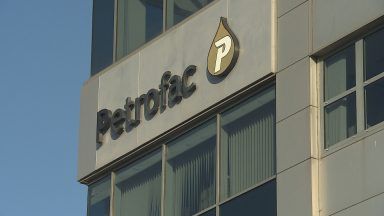There has been a 150% rise in liquidations in Scotland compared to the year before the Covid pandemic, data has revealed.
Figures show 187 out of 221 upper tier authorities in the UK (85%) saw a rise in insolvencies comparing 2019, the year before the pandemic, to 2022.
Comparing the nations, Scotland saw the biggest rise of 150%, with 27 of the country’s 32 councils seeing an increase.
The withdrawal of government support and soaring energy costs have been blamed for the rise, with retail and construction the hardest hit industries.
The largest total rise in Scotland was in the “professional, scientific and technical activities” category which went from 79 insolvencies in 2019 to 120 in 2022.
“Obviously, it was a really unusual time because of the pandemic, which sort of kept a very strong guard rail on that cliff edge – the courts were effectively closed for business and businesses were given lots of support to try and get them through the pandemic,” said insolvency expert Julie Palmer of Begbies Traynor.
Where in Scotland saw the most businesses wind up?
| Local authority | 2019 | 2020 | 2021 | 2022 | Four-year total | Difference between 2019 and 2022 |
| South Ayrshire | 2 | 4 | 8 | 13 | 27 | 550% |
| North Ayrshire | 2 | 4 | 11 | 12 | 29 | 500% |
| Dundee City | 5 | 3 | 13 | 28 | 49 | 460% |
| Dumfries and Galloway | 1 | 3 | 3 | 5 | 12 | 400% |
| East Ayrshire | 3 | 1 | 8 | 15 | 27 | 400% |
| East Lothian | 2 | 3 | 1 | 10 | 16 | 400% |
| Stirling | 2 | 3 | 8 | 9 | 22 | 350% |
| West Lothian | 3 | 6 | 12 | 13 | 34 | 333% |
| Highland | 7 | 5 | 11 | 28 | 51 | 300% |
| Midlothian | 3 | 7 | 5 | 12 | 27 | 300% |
| Angus | 2 | 2 | 5 | 7 | 16 | 250% |
| Argyll and Bute | 2 | 1 | 3 | 6 | 12 | 200% |
| Falkirk | 4 | 4 | 9 | 12 | 29 | 200% |
| Inverclyde | 2 | 3 | 4 | 6 | 15 | 200% |
| South Lanarkshire | 11 | 9 | 26 | 32 | 78 | 191% |
| Renfrewshire | 7 | 12 | 22 | 20 | 61 | 186% |
| East Renfrewshire | 3 | 2 | 7 | 8 | 20 | 167% |
| Aberdeenshire | 12 | 22 | 29 | 30 | 93 | 150% |
| Fife | 10 | 3 | 25 | 25 | 63 | 150% |
| Glasgow City | 58 | 35 | 97 | 134 | 324 | 131% |
| City of Edinburgh | 34 | 36 | 55 | 78 | 203 | 129% |
| North Lanarkshire | 14 | 5 | 17 | 32 | 68 | 129% |
| East Dunbartonshire | 7 | 3 | 7 | 15 | 32 | 114% |
| Clackmannanshire | 3 | 5 | 8 | 67% | ||
| Moray | 3 | 3 | 3 | 5 | 14 | 67% |
| Aberdeen City | 20 | 24 | 28 | 30 | 102 | 50% |
| Perth and Kinross | 10 | 1 | 13 | 10 | 34 | 0% |
| Shetland Islands | 2 | 2 | 0% | |||
| West Dunbartonshire | 7 | 4 | 6 | 17 | -14% | |
| Scottish Borders | 3 | 1 | 3 | 2 | 9 | -33% |
| Na h-Eileanan Siar | 1 | 3 | 4 | -100% | ||
| NATIONAL TOTALS | 243 | 207 | 440 | 608 | 1498 | 150% |
During 2020, there was a temporary pause of the “strike off” process. This was to give businesses affected by the coronavirus (Covid-19) pandemic the time they needed to update their records filed with Companies House and help them avoid being struck off the register.
The impact of this announcement was that “compulsory dissolutions”, where companies are struck off for failing to file accounts, were temporarily paused.
But experts at the time said many of the support packages put in place during 2020 would only help to delay inevitable closures in many cases.
“Some of those businesses have emerged from the pandemic doing well, but for many others trading is very difficult, particularly those that are in consumer-facing sectors,” Ms Palmer said.
“We are seeing rising levels of distress that’s beginning to translate in terms of a pickup in insolvency rates, we haven’t seen that massive falling off the cliff edge yet, but I think some factors will speed up that process a little bit.”
Stuart Adam from the Institute for Fiscal Studies (IFS), said while many firms had been “tided over during a period of hibernation” through loans and tax deferrals, those measures would not tackle “piling up” debts.
Liquidations began to rise following the end of the furlough scheme in September 2021.
Follow STV News on WhatsApp
Scan the QR code on your mobile device for all the latest news from around the country




























